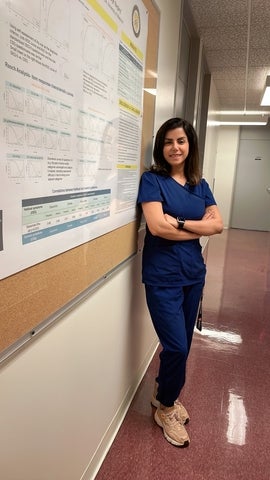Science that matters: Doctoral student researches ways to revolutionize the diagnosis and treatment of dry eye disease (DED)
By Alyana Versolatto
Graduate Recruitment Officer
The prevalence of dry eye disease (DED) has increased significantly due to prolonged screen time and Mana Monfared, a current PhD in Vision Science student, is dedicated to studying the disease and its effects on eye health.
Monfared pursued her optometry education in her home country of Iran and honed her skills there for nearly a decade. In Iran, she worked alongside esteemed optometrists and ophthalmologists, and saw first-hand the persistent challenges many patients face with untreated or worsening dry eye disease. In the lab at Waterloo, she is striving to develop innovative instruments to simplify the diagnostic process for healthcare professionals and facilitate the monitoring of treatment outcomes. The evolution of these tools could enhance treatment, elevate the quality of life for individuals with the disease and boost workforce productivity.
What drew you to pursue your PhD in Vision Science at Waterloo?
I interacted with a diverse array of patients and witnessed the challenges many of them faced with dry eye disease and at the School of Optometry and Vision Science I knew I could greatly enrich my knowledge and expertise on the matter.
In the program, I’ve had the incredible opportunity to collaborate with Dr. Paul Murphy, a renowned expert in the field of anterior eye care, along with the other outstanding individuals. The decision to select Waterloo as my academic destination has been a rewarding decision.
What is the working relationship like with your supervisor, professor Paul Murphy?
One of the most serendipitous blessings I've encountered during my time in Canada has been finding an extraordinary mentor. Dr. Paul Murphy is not only an exceptional educator and guiding force but is also a modest and compassionate individual. Through my association with him, I've gained valuable academic insights and invaluable life lessons.
What is a rewarding experience you have had outside of the lab?
Competing in GRADflix was a remarkable opportunity to prepare and learn how to present my research to the public. It provided a platform for me to succinctly convey in 60 seconds how my work at the university can contribute to the betterment of society, and I acquired valuable skills in digital media and filmmaking.
Have you been involved in any campus activities at Waterloo?
Since early 2023, I have been the Communications Officer for Graduates in Vision Science (GIVS) council. My responsibilities include orchestrating workshops, hosting weekly BBQs, and collaborating with students and campus organizations. Additionally, I work within the Accessibility Services department at the University of Waterloo which allows me to network and make meaningful connections.

Mana Monfared (she/her)
Doctor of Philosophy (PhD) in Vision Science student